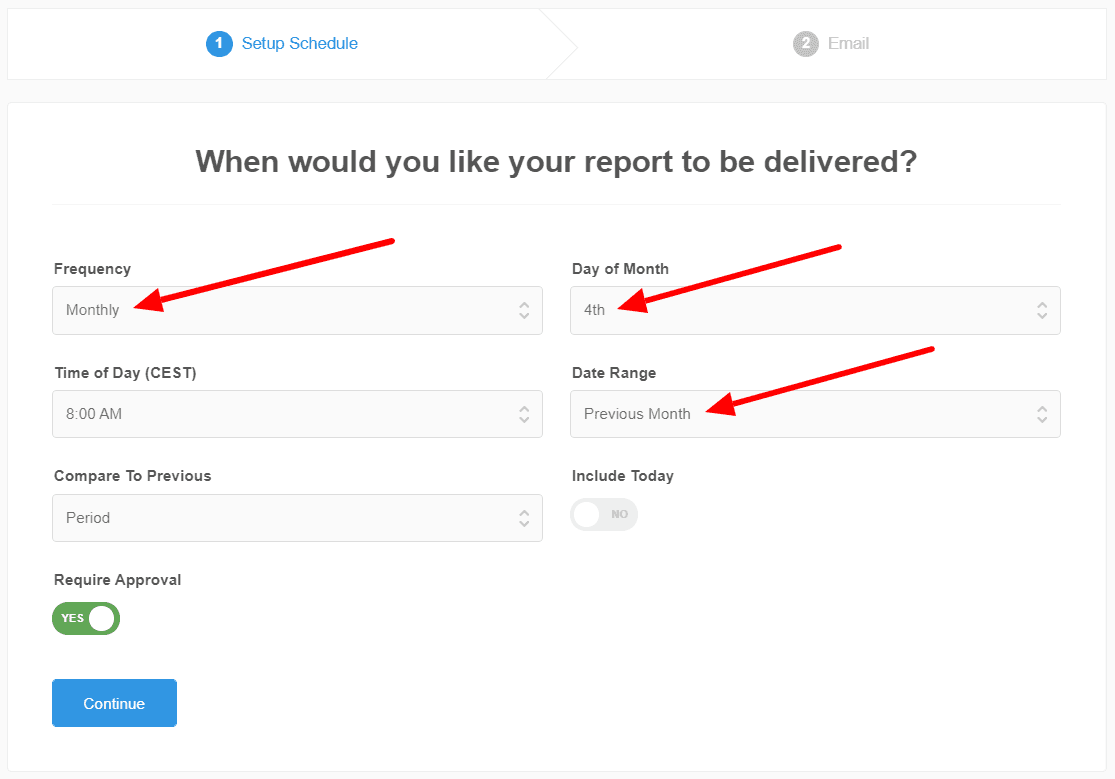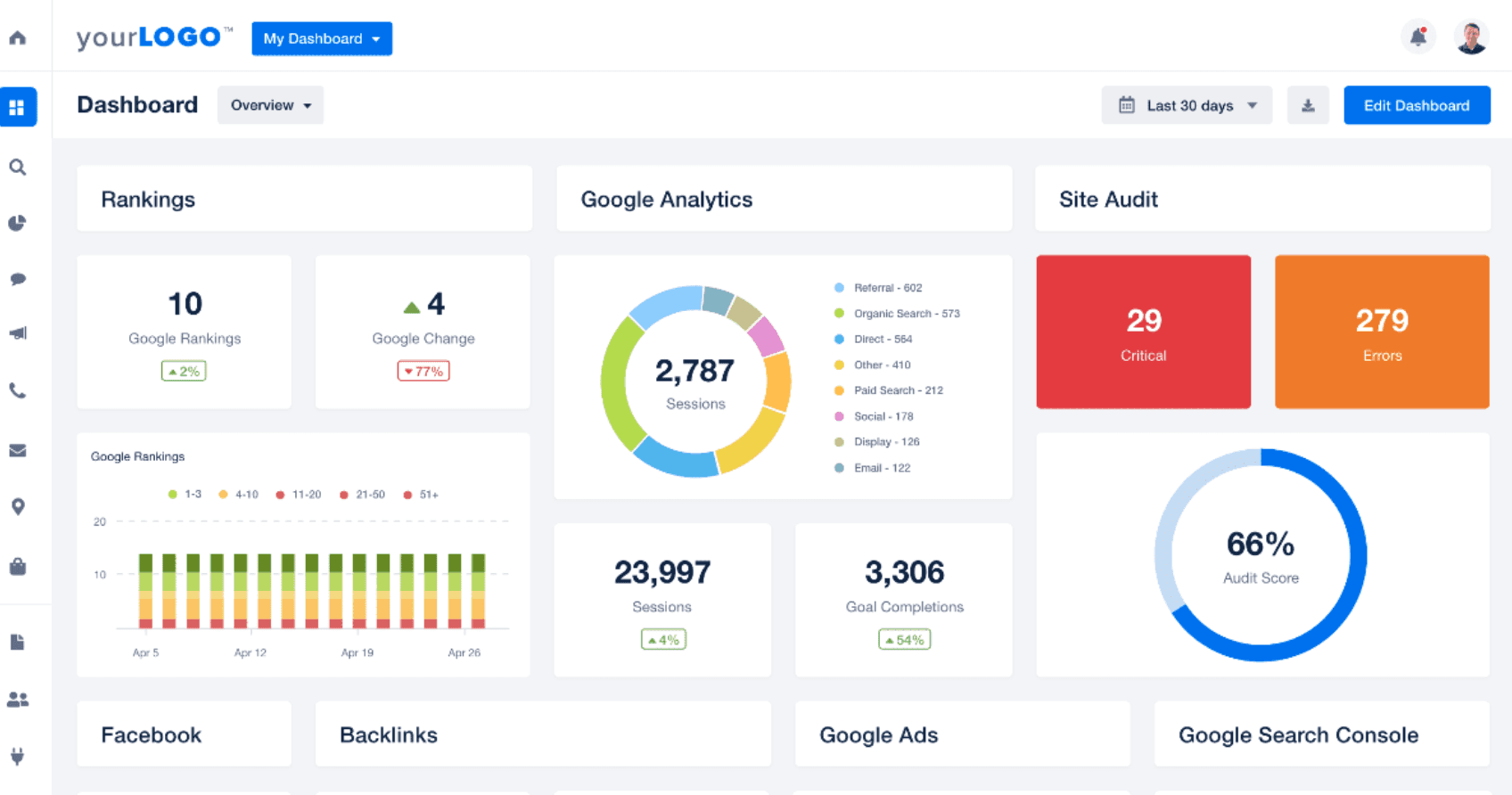Table of Contents
Table of Contents
- Why Emotional Intelligence Matters in Leadership
- Empathy: The Heart of Effective Leadership
- Reading Body Language: The Silent Cues of Leadership
- Using Intuition To Trust Your Gut in Leadership Decisions
- Managing Difficult Conversations With Emotional Intelligence
- Creating
- The Long-Term Benefits of Emotional Intelligence in Leadership
7,000+ agencies have ditched manual reports. You can too.
Free 14-Day TrialQUICK SUMMARY:
Emotional Intelligence (EI) is the ability to recognize, understand, and manage emotions—both in oneself and others. In leadership, especially within marketing agencies, EI is critical for building strong client and team relationships. Leaders with high emotional intelligence navigate complex human dynamics, building trust and collaboration. This guide from Jessica Tappana shares how to develop EI skills to enhance leadership skills and drive meaningful outcomes in client interactions and team performance.
Imagine you’re halfway through a critical client pitch. Prior to the meeting, you spent time perfecting every detail. This is a client you really want to work with. You feel like your agency could make a big difference and truly help this business grow. You felt like you really knew their business and how your agency could help.
Yet, you now face a client who seems uninterested despite your best efforts. Their body language screams disconnection; they’re checking their phone, barely engaging with your presentation. Frustration starts to bubble up as you sense the meeting slipping away. You push through, sticking to the agenda and offering more data, hoping to turn things around.
The client ends the meeting with a polite but noncommittal nod, and you feel deflated. Despite following all the conventional business and marketing wisdom—preparing meticulously, presenting confidently, and addressing client concerns—you can't shake the feeling that something fundamental was missing.
In the aftermath, you’re left wondering: Was it the pitch presentation? The data? Or was there something deeper that could have turned this encounter into a win?
This scenario highlights an important element of effective leadership: emotional intelligence. In the high-stakes world of agency marketing, where every client interaction counts, it’s not about what you say or how you present it. It’s about tuning into the unspoken signals. Understanding the emotional landscape of your clients and adapting your approach in real time can truly set you apart.
Soft skills matter. Empathy, intuition, and emotional insight can transform client interactions, team dynamics, and leadership effectiveness. Today, I’m going to share some tips for increasing your emotional intelligence and leveraging this critical toolkit to enhance your agency’s growth.
Why Emotional Intelligence Matters in Leadership
Emotional Intelligence (EI) isn’t just a buzzword. It’s a crucial component of effective leadership. At its core, EI involves recognizing and managing your own emotions while also understanding and influencing the emotions of others.
Emotional Intelligence allows leaders to connect on a deeper level with their team and clients. This fosters trust and collaboration. It’s more than just being nice or empathetic. It's about harnessing these abilities to drive meaningful outcomes and build stronger relationships.
The truth is that these days both our employees and our clients have many options. There are a plethora of job opportunities out there. You’ve probably lost marketing agency employees for seemingly small reasons. There are also more and more marketing agencies out there. This means that our clients too have many options.
So, getting good results isn’t enough. Paying our employees well isn’t enough. If we want to be effective leaders in the marketing agency arena, we need to do more. And Emotional Intelligence is that “more.”
The simple truth is that when it comes to marketing agency leadership skills, emotional intelligence often outshines technical skills. Sure, being adept at SEO or data analytics is essential. But, it’s your ability to navigate the human element that makes the real difference.
A technically skilled leader might know how to optimize a campaign to perfection. But, without EI, they might miss the cues that indicate a team member is struggling or a client is unhappy.
Emotional intelligence allows leaders to pick up on these subtle signals. In turn, leaders then respond in ways that technical skills alone cannot. It’s this balance of emotional and technical expertise that truly sets top leaders apart.
Read More: Client Breakups: How to Conduct a Client Exit Interview
Empathy: The Heart of Effective Leadership
If we're talking about Emotional Intelligence as agency leaders, we're going to start with empathy. As a therapist and as an agency leader, I believe it's a foundation for success. Empathy allows us to connect with people on a human level. It allows people to feel seen. And as a leader, those are important.
Defining Empathy: More Than Just Feeling Sorry
Empathy is often misunderstood as feeling sorry for someone, but it’s much more nuanced. At its core, empathy involves genuinely understanding and sharing the feelings of others, without letting those emotions overwhelm or impair your own function. For leaders, this means connecting with your team and clients on a deeper level. It means sensing the needs of others and responding thoughtfully. It’s about walking in someone else’s shoes and appreciating their perspective. This is different from just offering sympathy or pity. It's more action-oriented.
The Power of Empathy in Client Relationships
For marketing agencies, empathy is important for converting and maintaining clients. When you truly understand a client’s frustrations or goals, you can tailor your strategies to meet their specific needs.
At my SEO agency, Simplified SEO Consulting, we serve therapists. I would argue that while therapists themselves have high emotional intelligence, they're actually challenging clients for a marketing agency. Why? Because they truly expect us to have high EI! And honestly, therapists can be anxious about investing money in marketing.
This is where empathy comes in. Summers are slow for therapists. When my team meets with a therapist in the summer, we'll often hear them complain about how they're not getting any calls.
It's easy to list all of the things our team is doing to help their business. Or, we could point to all the metrics that show that our SEO efforts are "working." But the bottom line is that these business owners get scared every summer. And taking a minute to acknowledge that fear and to empathize with how scary it is to not get calls gets us a LONG way with the clients we serve.
This approach not only builds trust but also fosters long-term partnerships. A client who feels heard and understood is more likely to remain loyal and engaged, even when faced with challenges.
The bottom line is that clients want you to understand them. They want to know that you "get it."
Think of a time where a business owner or business leader was unhappy with the initial results of a campaign. Think of how you or your team responded.
Can you think of a time when you were empathetic instead of defensive? When you acknowledged their concerns and fear? And then you came in with either an explanation of your strategy or collaborated with them to offer an alternative strategy? Likely, this helped smooth the emotional charge of the conversation. This approach not only resolves the immediate issue but also strengthens the client relationship.
Empathy vs. Sympathy: Maintaining Balance
Before we finish talking about empathy, I want to revisit the concept of sympathy. As a therapist, I’ve seen how excessive sympathy can sometimes hinder progress. And I think this is especially true of agency leaders.
For instance, a therapy client who becomes overly sympathetic towards others might struggle to set healthy boundaries. Agency leaders face the same issues. Empathy is important. Show your employees and clients that you care and are committed to finding creative, caring solutions. But avoid falling into the less action-oriented trap of just being sympathetic.
Clear boundaries help you support your team and clients effectively without becoming entangled in staff or client issues that hold your business back.
Empathy, when practiced correctly, helps leaders build stronger, more authentic connections, foster creative problem-solving, and maintain a healthy balance between support and boundaries.

Image: Jessica Tappana (right) helping a practice owner plan blog posts.
Reading Body Language: The Silent Cues of Leadership
The ability to understand what isn't being said makes the difference between a good leader and a great leader. Understanding body language helps agency leaders to:
Save a deal from going sour.
Ask an employee the right questions, and prevent a growing issue from getting out of control.
Convey that you care, or that you’re having a serious conversation.
Let’s take a closer look at the nuances of body language within the agency context.
Understanding Nonverbal Cues for More Effective Communication With Staff and Clients
Nonverbal cues reveal your clients’ true feelings and attitudes. For example, crossed arms, lack of eye contact, or restlessness may signal discomfort or disagreement.
Noticing these subtle signs helps you gauge the client's reaction to your presentation or proposal. This awareness allows you to adjust your approach in real-time, addressing concerns before they escalate.
I personally didn't go to school to be a business owner or any sort of leader, I went to college to be a therapist. Yet here I am, running two businesses with two teams of employees. This means I've learned leadership on the go.
One of the hardest lessons for me personally is that my employees don't always feel safe telling me everything they're thinking. They often keep things to themselves.
To know when this is happening, I often rely on reading body language. I look for:
The stiffening jaw.
Avoiding eye contact.
An employee nervously glancing at the door.
Someone fidgeting during a meeting.
Someone who seems "checked out" and clearly isn't paying attention.
These are all signs I want to step in and intervene with a staff member. Sometimes, they just have something else on their mind. Sometimes they're upset. Often, when invited they'll share their opinion in a way I can address directly. Or, sometimes it's as simple as speaking directly to that employee in a meeting to draw their attention back to the task at hand.
I can't even begin to tell you how often noticing these subtle things has made a difference in employee interactions.
How Misreading or Correctly Reading Body Language Impacts Outcomes
Imagine a marketing agency missed a client’s frustration signals, like crossed arms and no eye contact, during a meeting. They didn’t address these signs. This led to poor communication. The client became frustrated and never gave them a chance to fix the issue. They eventually left that marketing agency and went with someone else. Revenue was lost AND that client told their friends not to work with that marketing agency.
On the other hand, another agency was working with the same client. They noticed that this client seems to have strong opinions. That they at times start to cross their arms or sigh. When this happened, they spotted those signs. In those moments, they would ask a clarifying question and listen closely to the client's answers. They then changed their approach to fix the issue and keep the project on track.
These examples show how important it is to read body language. By improving this skill, you’ll build better client relationships and achieve better results. It’s a key ability for leaders who want to connect with clients and handle interactions smoothly.

Maintain healthy relationships with your clients. Use automated scheduling features that streamline client communication and keep everyone on the same page. Start your 14-day free trial of AgencyAnalytics.
Using Intuition To Trust Your Gut in Leadership Decisions
As leaders, we often read the latest books, listen to podcasts, or check out blog posts like this. And that’s a great way to get tips that will help you lead more effectively and grow your business. However, we can’t forget the importance of trusting your gut as well.
Balancing intuition with data-driven decisions is crucial. While data provides solid evidence and insights, intuition offers a personal touch based on experience and immediate context. Scientific studies support this balance. For instance, research shows that intuition is reliable when it’s informed by expertise and familiarity with a situation. It’s often what helps experienced leaders make quick, effective decisions even when all the data isn’t available.
Combining these approaches—using data to guide your decisions while allowing your gut instincts to influence the final choice—leads to more holistic and conscious agency leadership. Trusting your intuition doesn’t mean ignoring data; it means using both to navigate the complexities of leading a marketing agency with confidence.

Gain clarity on your clients’ marketing data in minutes with dashboards and reports from AgencyAnalytics. Start your 14-day free trial.
Managing Difficult Conversations With Emotional Intelligence
Handling tough conversations with emotional intelligence transforms conflicts into opportunities for growth. Active listening is key. It’s not just about hearing words but truly understanding the emotions and concerns behind them. Validate the core of the issue, acknowledging any genuine concerns, even if you don’t agree with every detail. This builds trust and shows respect.
Empathy also plays a crucial role in these interactions. By seeing the whole person behind the problem, you’re not only addressing the issue but also showing you care about their feelings and perspectives. This approach helps diffuse tension and opens up space for more productive dialogue.
For more on this topic, check out the blog post I’ve written on managing difficult conversations. It delves deeper into techniques for leveraging emotional intelligence to navigate these challenging discussions effectively.
Creating Agency Culture With Emotional Intelligence
Ideally, you want to move beyond just fostering your own emotional intelligence. The most successful marketing agencies will be those where the entire agency values emotional intelligence.
To do so, the agency must reward employees and team members for exercising emotional intelligence. Those who show empathy should be valued within the business. Here’s how:
Promote Emotionally Intelligent Team Members
People who are promoted to leadership positions should be those who not only excel in technical areas but also who have these soft skills that will help develop and build up those whom they will supervise.

Image: The Simplified SEO team working remotely with cameras on to connect with each other more personally.
Openly Celebrate Emotional Intelligence Qualities, Like Empathy
When team members show empathy and understanding, celebrate their efforts. Acknowledge their ability to connect with others and their skill in navigating complex emotions. This recognition reinforces the importance of emotional intelligence and motivates others to follow suit.
Encourage Open Dialogue
Create an environment where employees feel safe to come forward and share their thoughts, opinions, and concerns–even when the sentiment may not be entirely positive. Teams collaborate better when members understand and respect each other’s feelings.
For example, a team meeting where everyone’s ideas are heard and valued will lead to more creative solutions and higher morale. When people feel seen and appreciated, they’re more likely to contribute positively and work together smoothly.
Address and Resolve Internal Conflicts With Emotional Intelligence
Conflicts among team members are inevitable. In fact, I would say they’re welcome. Diverse opinions prevent groupthink and will lead to new ideas and to out of the box solutions.
Handling conflicts and differences of opinion with emotional intelligence means the difference between getting to a really productive solution or having a fracture in your team. Instead of letting disagreements fester, address them openly and empathetically.
For example, if two team members clash over a project approach, a leader who mediates with empathy will guide them to a constructive resolution by:
Making sure both sides feel heard.
Pointing out the strengths in each individual’s opinion.
Helping to find a solution that acknowledges the strengths in each person’s viewpoint.
Read More: How To Build a Winning Team in Your Agency
The Long-Term Benefits of Emotional Intelligence in Leadership
A team where emotional intelligence thrives is generally a team with less agency burnout, more job satisfaction and better teamwork. This in turn leads to better results for your clients and less employee turnover. All things we want as agency leaders, right?
When you, as a leader, show empathy and understanding, you build trust and credibility. You also set the tone for a culture where employees treat each other that same way.
Further, emotional intelligence plays a key role in maintaining long-term client relationships. When leaders and team members understand and respond to clients' emotional needs, it strengthens trust and loyalty. By connecting on a deeper level, you’ll better anticipate and address client concerns before they become issues. This proactive approach fosters lasting relationships and reduces the risk of clients seeking services elsewhere.
Investing in emotional intelligence pays off in many ways. From handling difficult conversations and understanding body language to balancing intuition with data, these skills enhance client interactions and team dynamics. Recognizing and rewarding emotional intelligence within your agency will build a more cohesive and motivated team, leading to better results for both your clients and your business.
Even if you're more comfortable with technical skills, remember that emotional intelligence is something you can continually develop. Embrace these skills, and you'll not only enhance your leadership but also create a thriving agency that stands out in the competitive market.

Written by
Jessica Tappana is a clinical therapist and owner of Simplified SEO, a successful SEO marketing agency operating out of Missouri.
Read more posts by Jessica TappanaSee how 7,000+ marketing agencies help clients win
Free 14-day trial. No credit card required.






